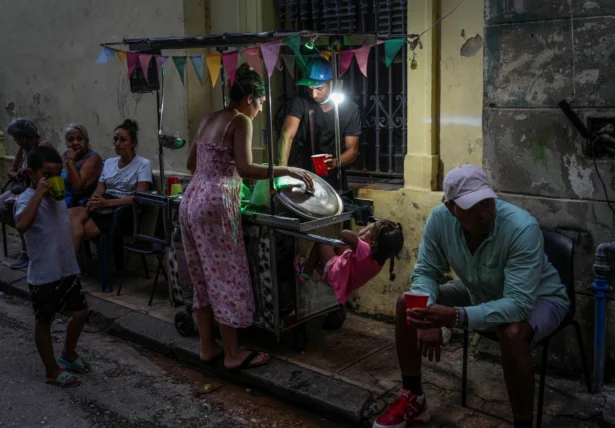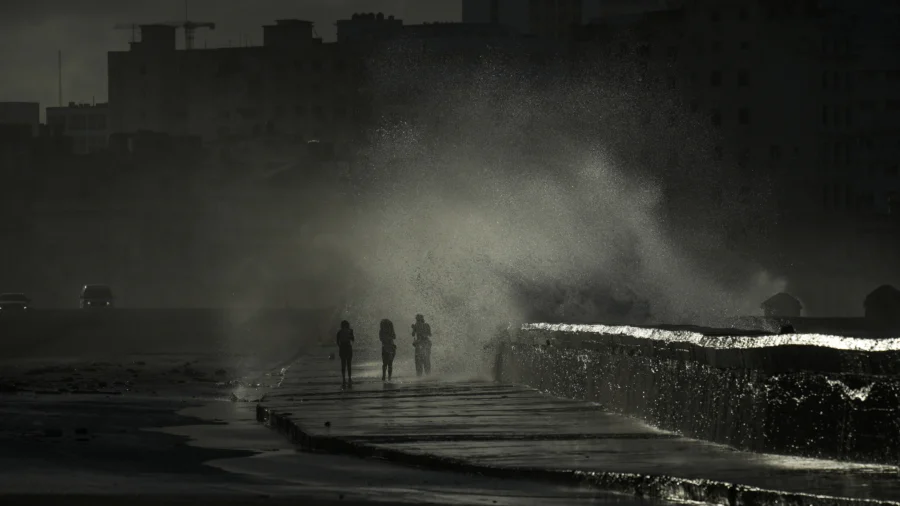HAVANA—Cuba’s capital remained largely paralyzed on Monday and the rest of the island braced for the fourth night of a massive blackout that has generated a handful of small protests and a stern government warning that any unrest will be punished.
Hurricane Oscar made landfall Sunday before crossing the island’s eastern coast as a tropical storm Monday with winds and heavy rain, leaving at least six dead after a night that saw protests by several dozen people in urban neighborhoods like Santos Suárez and central Havana.
Some banged pots and pans in the streets, while others demonstrated from their balconies. Protesters who said they have no water blocked at least one street with garbage.
“The country has completely halted,” said homemaker Mayde Quiñones, 55. She cares for her mother-in-law, who is in her 80s. “This hurts everyone, but the elderly most of all.”
The Cuban government has a low tolerance for civil disobedience and President Miguel Díaz-Canel warned on national television Sunday that “we’re not going to allow any vandalism, or let anyone disturb people’s tranquility.”
The prolonged nationwide blackout followed a massive outage Thursday night, part of energy problems that led to the largest protests in Cuba in almost 30 years, in July 2021. Those were followed by smaller local protests in October 2022 and March 2024.
It’s all part of a deep economic crisis that has prompted the exodus of more than half a million Cubans to the U.S., with thousands more heading to Europe.
The Cuban government and its allies blame the United States’ 62-year-old trade embargo on the island for its economic problems but White House press secretary Karine Jean-Pierre claimed Monday that the Cuban government’s “long-term mismanagement of its economic policy and resources has certainly increased the hardship of people in Cuba.”
Power remains relatively cheap but increasingly unavailable. The Cuban government has said that it’s producing 700 megawatts when peak demand can hit 3 gigawatts. Authorities said by Monday afternoon that about 80 percent of Havana had intermittent power but people were skeptical.
“We have the fridge full of food and we’re scared,” said small-business owner Juan Estrada, 53, whose central Havana business hasn’t had consistent power since Friday morning.

Energy Minister Vicente de la O Levy said in a news conference he hoped that more reliable electricity will be restored by Monday or Tuesday morning but classes remained closed through at least Thursday.
He said that Oscar, which made landfall on the eastern coast Sunday evening, will bring “an additional inconvenience” to Cuba’s recovery since it will touch a “region of strong (electricity) generation.” Key Cuban power plants, such as Felton in the city of Holguín, and Renté in Santiago de Cuba, are located in the area.
Oscar later weakened to a tropical storm but its effects were forecast to linger on the island through Monday.
Many of Havana’s 2 million people resorted to cooking with improvised wood stoves on the streets before their food went bad in refrigerators.
People were lining up Monday to buy subsidized food and few gas stations were open.
The failure of the Antonio Guiteras plant on Friday was the latest problem with energy distribution in a country where electricity has been restricted and rotated among different regions at different times. The status of Cuba’s other power plants was unclear.
People lined up for hours on Sunday to buy bread in the few bakeries that could reopen.
Some Cubans like Rosa Rodríguez had been without electricity for four days.
“We have millions of problems, and none of them are solved,” said Rodríguez. “We must come to get bread, because the local bakery is closed, and they bring it from somewhere else.”
The blackout was considered to be Cuba’s worst since Hurricane Ian hit the island as a Category 3 storm in 2022 and damaged power installations. It took days for the government to fix them.
The Cuban government announced emergency measures to slash electricity demand, including suspending school and university classes, shutting down some state-owned workplaces, and canceling nonessential services.
Local authorities said the outage stemmed from increased demand from small—and medium-sized companies and residential air conditioners. Later, the blackout got worse because of breakdowns in old thermoelectric plants that haven’t been properly maintained, and the lack of fuel to operate some facilities.
Cuba’s energy minister said the country’s grid would be in better shape if there had not been two more partial blackouts as authorities tried to reconnect on Saturday. De la O Levy also said Mexico, Colombia, Venezuela, and Russia, among other nations, had offered to help.

